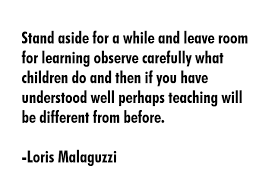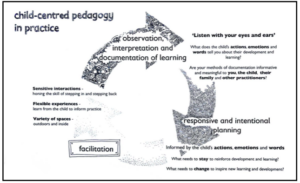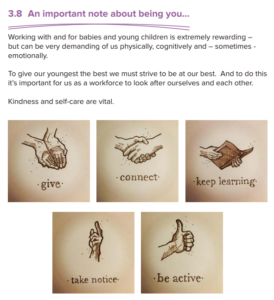
Back on a blustery September evening in Glasgow, myself and 2 other TAP teachers took ourselves to the warm, cosy enfolds of the Clayton Hotel to hear the inspirational Professor Carla Rinaldi in conversation with Professor Ger Grauss, organised by the folks at Education Scotland. Now, I admit that I am have a bit of a soft spot for some free CPD, but what I wasn’t prepared for the fire in my belly that Rinaldi and Grauss stoked in me. Rinaldi states that we as educators are responsible for the “Regeneration of Humanity”, not a phrase to be taken lightly!
I have had a year very focused on CPD as I was also lucky enough to be awarded a grant that allowed me to visit the ESHA (European School Heads Association) conference in the very different setting of Dubrovnik. The conference was headlined– School Leaders Making a Difference. I took away 4 main key themes from this conference – that of the importance of Connection, Collaboration, Innovation and Inspiration. There were key themes and overlaps emerging from this and the Reggio conversation – not least from Prof. Pushpanadham Karanam from The University of Baroda in India with his keynote on “Education on Global Citizenship” on how we have a responsibility to play our part in creating a better future for our children.
So I have been thoroughly inspired and I wanted the aim of this blog to be to look a little bit into how an ethical approach can be fostered through our documentation. This is going to be very much a whistle-stop tour and a very beginning to a journey, signposting you to areas of interest and research, but as always if you want further information don’t hesitate to get in touch with either myself directly, or your TAP teacher. It is something that I have a personal interest and passion for and intend to delve into much deeper over the coming months to develop my practice.
Our own EAC August Inservice training and new practice note around planning and observation has a huge focus on how we “listen” to children using our “eyes and ears” and interpreting the children’s “actions, emotions and words” I couldn’t resist an inclusion of our planning cycle here as a refresh as this really underpins our pedagogy and if we get this right we will be embodying an ethical pedagogy and getting it right for the children.

Rinaldi said of our role “we need to bring meaning to what the children express. Bring out what is inside them” Concurring with this, Early Years Consultant, Kym Scott, talks about “The Pedagogy of Listening” about “being conversation partners in play” and every conversation needs to start with good listening. If we meet the children with what they are interested in and use that as our shared focus of attention, they will be relaxed and thus most open to learning. This can be measured and evaluated by using the Leuven scale. If this is something that you want to know more about we can support with that.
As Early Years Practitioners, you may also be familiar with Friedrich Froebel, who invented the early concept of the “Kindergarten” and from whom we in Scotland draw inspiration for our own Early Years curriculum (he is mentioned throughout the national practice guidance document Realising the Ambition, Education Scotland, 2020) Froebel talks of unity and connectedness of everything in the universe, the holistic nature in which young children learn and that relationships matter. There is a wonderful toolkit published by the Froebel Trust around children’s participation fostering this here;
Children’s participation – Froebelian futures (ed.ac.uk)
Within our own authority and context, we are currently drafting our own practice note with particular relevance to our context. The first draft of this is available on the Early Years Glow tile and on request.
Whilst familiar with the Reggio Emilia and Froebellian approaches, I hadn’t encountered the “High Scope” approach before, but was introduced to it, also through a Kym Scott webinar. She shared this lovely video of an effective interaction.
Supporting Children’s Play – Eating Snakes
Looking outwards is crucial to developing our pedagogy so you can find out more about the High Scope approach here.
Welcome to HighScope! – HighScope Changing the trajectory of the world, one child at a time.
All of what has been explored about is a matter of repositioning the power balance between adult and child. It is timeous that I received an e mail today from Froebelian Futures about their annual conference, headlined
Repositioning Power In Early (and later) Childhood Tickets, Sat 25 May 2024 at 09:00 | Eventbrite.
A wonderful training offer here with great value AND Froebelian practitioners on hand so you can even bring your children!
Now we come to exploring some barriers. Rinaldi talked about “making the learning visible” in response to a question from the audience at her conversation, around how to promote play pedagogy to a demographic of parents whose culture favoured more traditional approaches to learning. You can make the learning visible through your methods of documentation – for example true Floorbooks and guidance around this is also available on the Glow tile, on request and we are currently in the process of developing some CPD. Watch this space! There is also some useful information here to support you in effectively making the learning visible.
How-to Guide: Reggio-Inspired Documentation — Roots & Wings (rootsandwingsfc.com)
Another issue is that of our presence in play. If we are so focused on solely the documentation, can we truly be present? This is a mistake that certainly I have made in the past when working with Floorbooks. I was so obsessed with trying to capture moments in the children’s experiences – photos, quotes on post it notes – that I was maybe guilty at times of not truly listening to the children. Why not challenge yourself to down all tools such as post its, cameras, Ipads (for your use) and get right in and really play with the children and commit to spending the time reflecting and recording at the end of the play. I promise it will do wonders for your mental health too!
I hope that my short blog and beginning of journey into looking outwards has inspired you as much as it inspired me and has emphasised the magnitude of importance that our job has on future societies. Given that, remember to look after yourselves and your colleagues (Realising the Ambition, p 42) Culture change takes time and courage and risk. To finish with another Rinaldi quote;
“To educate is also to be an example. It is not enough to talk we need to act!” “What we model is what our message is!”

For further information on ethical pedagogy and specifically the Reggio approach, here are some links to starting points.
The Reggio Emilia Approach to Early Years Education | Resources | National Improvement Hub
elc35_reggioaug06.pdf (education.gov.scot)(we have paper copies of this in our central TAP resources- available on request )
Observation and Documentation – Reggio Emilia (weebly.com)
By Emma Williamson

